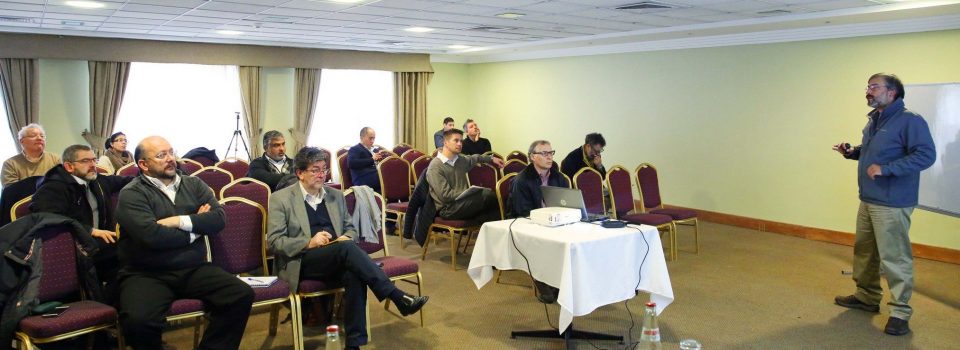IFOP and SUBPESCA organize an expert panel of climatic change
July 11th, 2016 EnIn Valparaíso, an expert panel was carried out about climatic change, which is part of the project of IFOP “logistical support for the development and management of regional action plans and programs of aquatic species conservation and adaptation to climate change in fisheries and aquaculture.”
EnIn Valparaíso, an expert panel was carried out about climatic change, which is part of the project of IFOP “logistical support for the development and management of regional action plans and programs of aquatic species conservation and adaptation to climate change in fisheries and aquaculture.”
During the activity, the following were the exponents: Dr. Samuel Hormazábal, Director of the School of Marine Sciences of Universidad Católica, Dr. Leonardo Guzman, Chief of the Division of Aquaculture Research of IFOP, Dr. Rodolfo Sapiains, Center for Climate Science and the resilience of the Universidad de Chile, Dr. Cristian Vargas, Faculty of Environmental Sciences of University of Concepción, Dr. Silvio Pantoja, director of southern austral COPAS Program, Dr. Carlos Molinet, Institute of Aquaculture of Universidad Austral, Elizabeth Palta, head of the economy section of IFOP.
Leonardo Núñez, Executive Director of IFOP, explained that “the institution has commenced an internal reorganization process intended to enhance oceanography. A specific department was created within Fishing Research Division, with the purpose of generating the necessary information which could allow us to understand in a more precise way the real effects of the climatic change in the ocean and our marine resources.”
El Dr. Samuel Hormazábal, detailed: “I showed a picture of how the system of the eastern edge of Chile-Peru works, in physical terms and in dynamic terms and the impact it has on the ecosystem and climate variability associated with El Niño in the southern zone, the system is much more complex than what expected, because everything is very interrelated, there is a direct connection, for instance, a fluctuation in the wind of the equatorial zone can generate eddies on the coast of South America, which can then reach seamounts and oceanic islands with nutrient-rich waters generating an increased biological production.”
Regarding the climatic change, Dr. Silvio Pantoja, added “the system is highly complex, besides of the variations generated by the increase of ocean temperature and the planet. In general, there are some changes which overlap like El Niño, which is immersed in the environment. If you add the fact that half of the world’s population is associated in one way or another to ocean, either live near the sea or use the coast for navigation or tourism, that creates other problems in the ocean like waste by human activity, sewage and other impacting the environment. We have to decide as a society how far we can go with this, so we could have a healthy environment.
Climate change is related to the effects on ocean regime change; there are places where spawning areas have cooled, so the recruitment of species decreases”
The Dr. Leonardo Guzman of IFOP focused his presentation around “guidelines and patterns to be developed with the community when red tide or longer-term changes such as climate change occur, so the people could understand the actions to be taken by the authority to minimize impacts; activities to be undertaken at individual level and at the level of an organized society to achieve certain changes in people were included; to know and understand the environment in which they live and how they can respond responsibly when the authority takes measures aimed at protecting public health, for example in the case of harmful algae, and also to minimize impacts on productive activities “
